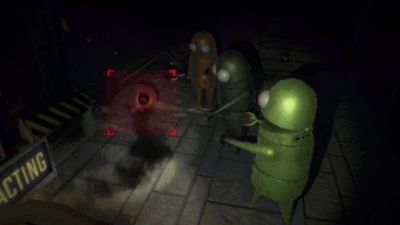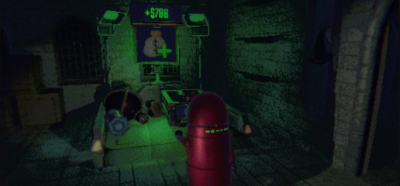R.E.P.O. Unbound: Redefining Gaming with Immersive Storytelling and Universal Access
An In-Depth Look at R.E.P.O.
As an experienced gamer who has witnessed the evolution of countless titles, I was both intrigued and cautiously optimistic when R.E.P.O. first hit the scene. This game draws you into a meticulously designed universe, where every element, from its art style to gameplay mechanics, is carefully engineered to deliver a unique journey. Throughout the experience, I discovered surprises that reminded me why innovative titles continue to captivate loyal fans and curious newcomers alike.
Immersive Gameplay and Fluid Mechanics
Stepping into R.E.P.O. feels like entering a realm that balances intuitive controls with deep, rewarding mechanics. One of the best features of R.E.P.O. is its versatility; whether you choose to download the game on your favorite platform or explore the realms of unblocked access in restrictive environments, the experience remains consistently engaging. The gameplay offers a smooth transition between action-packed sequences and thought-provoking puzzles that require strategy and attention to detail.
Moreover, the developers have placed great effort into infusing the game with a sense of pace and flow that ensures each session is both exciting and unpredictable. From the first moments of your initial gameplay to the rich, narrative-driven levels that follow, every segment exposes layers of detail and a wealth of secrets waiting to be uncovered. This is especially exciting when considering the additional challenges provided by strategic cheats and mods that further enhance replayability.
Vivid Graphics and Captivating Soundtrack
Graphically, R.E.P.O. is a masterpiece that combines artistic vision with technical prowess. The environments are visually arresting, shifting between stark, isolated landscapes and vibrant urban complexes that come to life with every passing minute. The textures, lighting, and dynamic weather effects showcase the developers’ attention to detail and commitment to improving the player’s visual experience at every level.
The soundtrack plays a crucial role in setting the game’s tone. Its meticulously scored music adapts to the tempo of the gameplay, enhancing the high-stakes moments and adding depth during quieter, more intimate sequences. When you play R.E.P.O., the audio design complements the visual aesthetics, ensuring that every discovery and mysterious twist is both felt and heard in a crescendo of digital artistry.
Nuanced Storytelling and Narrative Depth
R.E.P.O. weaves a compelling narrative that is far from linear, opting instead to place emphasis on exploration and player-driven outcomes. The story unfolds gradually as you progress, with multifaceted characters whose motivations are deliberately ambiguous, providing ample opportunities for interpretation. The narrative is structured to allow flyer-like, open-ended exploration, inviting interpretations that are influenced by both your choices and the hidden elements scattered throughout the levels.
Unique dialogues, side quests, and environmental storytelling come together to form a universe where every interaction matters. There's a gentle balance between high energy sequences and quiet, introspective moments, ensuring that neither the action nor the drama feels out of place. During extended sessions and rounds especially when you decide to install various mods, the narrative becomes enriched, giving an ever-expanding reason to come back and explore every corner of R.E.P.O.’s world.
Customization with Cheats and Mods
For enthusiasts who love diving deep into game mechanics, R.E.P.O. offers robust support for cheats and mods. The inclusion of a vibrant community of modders has augmented the game’s already impressive array of features. While the game is finely balanced on its own, the additional layer of custom challenges and tweaks provided through user-created mods only enhances the experience further.
Players can modify several aspects of the game, which means no two gameplay sessions are ever the same. Whether you’re keen to experiment with alternate control mechanisms or try some playful in-game modifications, these features are a testament to the developers’ commitment to longevity and player satisfaction. In fact, the innovative approach to integrating cheats into the core gameplay allows for a variety of strategies and fosters a community of dedicated players who continuously push the limits of what the game can offer.
Accessibility and Unblocked Options
It is refreshing to see a game that doesn’t restrict its audience. R.E.P.O. is available on numerous platforms, making it easy for anyone to download, play, and enjoy—even in environments that typically impose strict download and streaming regulations. The game’s design anticipates the needs of players who often find themselves wanting to experience new titles in environments with heavy access restrictions.
The unblocked access feature means that R.E.P.O. can be played in schools, workplaces, or any location where online gaming options are otherwise limited. This flexibility is supported by a variety of download formats and even cloud-based versions, ensuring that no matter what device you are using—PC, Mac, or even Android—the gameplay feels fluid and responsive. The ability to install and run the game without the need for cumbersome emulators or extensive compatibility tweaks makes it a significant hit among players who appreciate hassle-free experiences.
Platform Availability and Versatility
In today's diverse digital ecosystem, platform versatility is key for any successful game. R.E.P.O. excels in this regard by spreading its reach across multiple channels. Whether you are interested in the traditional download-and-install method or prefer to explore the cloud/emulator route, the flexibility is an absolute boon for players. It is available across mainstream and alternative platforms, ensuring that language or operating system barriers never become an obstacle.
With this widespread compatibility, you can easily switch from playing on a high-end gaming rig to experiencing the game on a portable device, all without significant compromises in graphical fidelity or gameplay smoothness. The attractive proposition of an easily accessible download, coupled with support for unblocked modes and a plethora of cheat options, provides a seamless integration that caters to the demands of a modern gaming audience.
Performance, Stability, and Technical Insights
One area where R.E.P.O. truly shines is in its overall performance and technical execution. The game manages to maintain stability even during intense and prolonged sessions, a feat that is often challenging for ambitious titles. Operating on a well-optimized engine, the gameplay remains consistently smooth, whether you choose to install additional mods or explore creative cheat possibilities for extra layers of fun.
In addition, performance tweaks and configuration options allow players to adjust the game’s settings to suit their hardware. This includes options to fine-tune graphics and resolution, enabling an optimal balance between visual quality and system performance even on machines with lower specifications. Notably, the game receives regular updates from the developers, ensuring that compatibility issues on various platforms are kept at bay.
Visual Diversity and Level Design Mastery
The designers of R.E.P.O. have shown immense creativity in how they bring each level to life. Level design is intricate and multifaceted, compelling you to navigate through environments that are as strategically demanding as they are visually distinct. As you progress, the diverse settings create an ever-evolving puzzle that challenges both your reflexes and analytical skills. Whether you are deciphering clues in shadowy corridors or engaging in dynamic sequences in open outdoor settings, you are constantly met with new scenarios that require both immediate action and long-term planning.
This visual diversity is complemented by intelligent level layouts that encourage exploration and reward player curiosity. Not only does this approach provide a thrilling escape, but it also amplifies the importance of each choice you make in maneuvering through the narrative. When combined with the creative freedom offered by cheats and mods, the possibilities for personalization and experimentation seem limitless, keeping the gameplay experience both fresh and challenging.
Community Engagement and Extended Gameplay
R.E.P.O. is not just a game; it is a community-centric phenomenon that has gathered a passionate following. The game’s developers actively support a thriving online community where players share experiences, strategies, and even custom content. This collective effort has turned the game into a living platform that evolves over time. Community challenges, competitive modes, and in-game events provide additional replay value that extends well beyond the core narrative.
Frequent community-driven events, online tournaments, and collaboration opportunities position R.E.P.O. as a game that values player input and collaborative development. Whether you choose to participate in discussions about the latest cheat discoveries or contribute to evolving mods that enhance gameplay, the sense of community elevates your overall connection with the game. This dynamic exchange ensures that even seasoned gamers, who have experienced many titles, find new reasons to revisit R.E.P.O. over and over again.
Ease of Installation and User Experience
For potential players contemplating whether to download or simply play R.E.P.O., the installation and onboarding process is notably straightforward. The developers have placed an emphasis on user-friendly setup instructions that make it easy for both novices and experts to get started. This simplicity in installation does not come at the expense of quality; instead, it highlights the commitment to an inclusive gaming experience.
The installation process is streamlined and clearly documented, reducing any potential technical barriers. Whether you are curious to test the game for free or be part of a broader family of players across various platforms, every step is designed to ensure that you quickly and efficiently get into the digital action. The ease of use makes R.E.P.O. a standout title for players seeking a hassle-free yet deeply rewarding gaming journey, and for those wanting to explore alternate options like cloud-based play, unblocked setups, or even engaging cheat-driven modifications.
Final Thoughts: A Testament to Modern Game Development
In reflecting on the overall experience, it is clear that R.E.P.O. has managed to capture the quintessence of modern game development. Blending intricate storytelling with expansive gameplay mechanics, this title serves as a noteworthy benchmark in today’s competitive gaming market. It invites you on an epic journey that seamlessly integrates rich narrative threads, versatile mod and cheat options, and an innovative approach to accessibility across various platforms.
The amalgamation of cutting-edge graphics, adaptive soundtracks, and versatile installation options ensures that R.E.P.O. is well-suited for a broad audience. Whether you are a long-time gamer in the pursuit of nuanced gameplay or a newcomer searching for a free title that delivers both depth and entertainment, this game promises to deliver on its ambitious pitch. As you navigate its multifaceted challenges and immerse yourself in an ever-evolving digital playground, you will soon discover that every decision—whether influenced by in-game cheat options or thoughtfully designed mods—contributes to an experience that is simultaneously personal and universally resonant.
Ultimately, R.E.P.O. stands as a testament to the creativity and technical expertise that drive the modern gaming industry. Its impressive range of features and commitment to innovation ensure that its presence will be felt for years to come. For those interested in embarking on this enthralling adventure, the process is straightforward: simply download the game, install it on your preferred platform, and prepare for an unforgettable journey filled with mystery, exploration, and the satisfaction that only a masterfully crafted game can provide.
How to Download R.E.P.O.
R.E.P.O. is available across multiple platforms, be it PC, Mac, Android, or even less conventional devices. You can download this engaging title via its official website; some platforms also offer free access or unblocked versions enabling play in restricted environments. The game is accessible as a free download in certain regions, and there is an option to install additional features like mods to further enrich the experience.
On most platforms, the download process is straightforward: access the official site, locate the download link for your system, and follow simple installation instructions. For cloud-based or emulator-based play, select the corresponding option during the setup process. Minimum system requirements include a functioning dual-core processor, at least 4GB of RAM, and decent integrated graphics for PC/Mac users, while Android devices should run on recent OS versions. Although cheats and mods are not mandatory, numerous community-supported modifications are available to customize gameplay further, and the unblocked access feature ensures you can enjoy R.E.P.O. in various environments, including schools and workplaces.



















